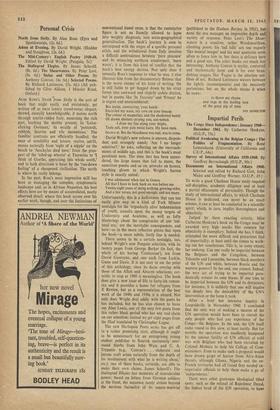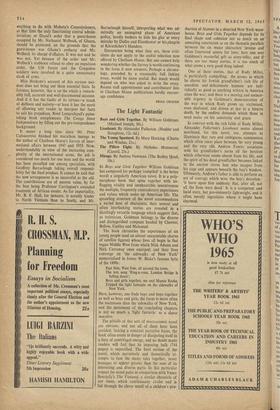Impartial Perils
Survey of International Affairs 1959-1960. By Geoffrey Barraclough. (0.U.P., 90s.) Documents on International Affairs 1960.
Selected and edited by Richard Gott, John
Major and Geoffrey Warner. (0.U.P., £5) To write a good Chatham House study requires. self-discipline, academic diligence and at least a partial effacement of personality. Though the study of international affairs, to which Chatham House is dedicated, can never be an exact science, it can at least be conducted in a scientific spirit; which, in turn, implies thoroughness and objectivity.
Judged by these exacting criteria, Miss Catherine Hoskyns's book on the. Congo must be awarded very high marks. Her concern for objectivity is exemplary. Indeed she has, I think, attempted the more difficult and precarious feat of impartiality, at least until she comes to work- ing out her conclusions. This is, to some extent, her undoing. Can one really be impartial between the Belgians and the Congolese, between Tshombe and Lumumba, between black members of the UN and white, between Russia and the western powers? In the end, one cannot. Indeed, the very act of trying to be impartial para- doxically creates its own biases. If one tries to be impartial between the UN and its detractors, for instance, it is unlikely. that one will inquire too deeply into the desirability of the UN's intervention or the form it took.
After a brief but intensive inquiry in Leopoldville in November 1960, I concluded that the only way of making a success of the UN operation would have been to recruit the only people who had any experience of the Congo—the Belgians. In the end, the UN itself came round to this view, at least tacitly. But for months the operation was needlessly hampered by the sinister futility of UN officials at cold war with Belgians who had been recruited by Colonel Mobutu to help his College of Com- missioners. Even to make such a proposal would have drawn gasps of horror from' Afro-Asian throats, although Ghana, Nigeria and the ex- French territories had all found they needed ex- imperialist officials to help them make a go of 'independence.'
There were other grotesque ideological blind spots; such as the refusal of Rajeshwar Dayal, the Indian head of the UN operation, to have anything to do with Mobutu's Commissioners, at that time the only functioning central admin- istration; or Dayal's order that a guest-house occupied by Mr. Nathaniel Welbeck, of Ghana, should be protected, on the grounds that the guest-house was Ghana's embassy and Mr. Welbeck its chargé d'affaires. It was not and he was not. Yet because of the order and Mr. Welbeck's stubborn refusal to obey an expulsion order, the UN forces and the Congolese soldiery were involved in a quite unnecessary clash of arms.
Miss Hoskyns's account ot this curious inci- dent does not bring out these essential facts. In fairness, however, this is on the whole a remark- ably full, accurate and well-documented account. And if it has the faults of its virtues—a touch of dullness and naivety—at least it has the merit of allowing any reader to interpret her facts to suit his prejudices. Rend Lemarchand's pains- taking book complements The Congo Since Independence by filling out the pre-independence background.
It seems a long time since Mr. Peter Calvocoressi finished his marathon innings as the author of Chatham House's Survey of inter- national affairs between 1947 and 1953. Now, understandably in view of the increasing com- plexity of the international scene, the job is considered too much for one man and the world has been parcelled out among specialists, with Geoffrey Barraclough taking overall responsi- bility for the final product. It cannot be said that the new arrangement is as successful as the old. The contributions are of uneven value, by far the best being Professor Carrington's extended treatment of African events. As for impartiality, Mr. R. F. Hall, for instance, is notably kinder to North Vietnam than to South; and Mr. Barraclough himself, interpreting what was ad- mittedly an uninspired phase of American policy, hardly bothers to hide his glee at every mistake by Dulles and Eisenhower or his Fhagrin at Khrushchev's blunders.
Documents being what they are, these criti- cisms do not apply to the useful selection now offered by Chatham House. But one cannot help wondering whether the Survey is worth continuing in the form it now assumes. Perhaps a chrono- logy, preceded by a reasonably full linking essay, would be more useful. But much would depend on who was asked to write the essay. Recent staff appointments and contributors' lists in Chatham House publications hardly encour- age confidence.
BRIAN CROZIER



































 Previous page
Previous page